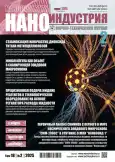Living cell as an object in scanning probe microscopy
- Authors: Akhmetova A.I.1,2, Yaminsky I.V.1,2
-
Affiliations:
- Lomonosov Moscow State University
- Advanced Technologies Center
- Issue: Vol 18, No 2 (2025)
- Pages: 144-147
- Section: Nanotechnologies
- URL: https://journals.eco-vector.com/1993-8578/article/view/678961
- DOI: https://doi.org/10.22184/1993-8578.2025.18.2.144.147
- ID: 678961
Cite item
Abstract
The mechanical properties of cells and tissues can reflect pathological conditions such as tumors, inflammation, and viral infections. Probe microscopy allows one to evaluate the mechanical properties of biological samples with minimal impact on the object of study. Advanced probe microscopy methods allow one to evaluate cell morphology and rigidity, measure elasticity, Young’s modulus, adhesion, and resistance to mechanical impact, and record force curves at a specific point. In addition, AFM allows one to perform noninvasive and nondestructive measurements with simple sample preparation in air and in an aqueous environment at room temperature, which significantly increases its advantage for studying biological functions.
Full Text
About the authors
A. I. Akhmetova
Lomonosov Moscow State University; Advanced Technologies Center
Email: yaminsky@nanoscopy.ru
ORCID iD: 0000-0002-5115-8030
Physical Department, Cand. of Sci. (Physics and Mathematics), Senior Researcher
Russian Federation, Moscow; MoscowI. V. Yaminsky
Lomonosov Moscow State University; Advanced Technologies Center
Author for correspondence.
Email: yaminsky@nanoscopy.ru
ORCID iD: 0000-0001-8731-3947
Physical Department, Doct. of Sci. (Physics and Mathematics), Prof., Director General
Russian Federation, Moscow; MoscowReferences
- Akhmetova A.I., Sovetnikov T.O., Terentyev A.D., Yaminsky I.V. Scanning capillary microscopy of fibrosarcoma. NANOINDUSTRY. 2025. Vol. 18. No. 1. PP. 40–46. https://doi.org/10.22184/1993-8578.2025.18.1.40.46
- Sovetnikov T.O., Akhmetova A.I., Gukasov V.M., Evtushenko G.S., Rybakov Y.L., Yaminskii I.V. Scanning probe microscopy in assessing blood cells roughness. Bio-Medical Engineering. 2023. https://doi.org/10.1007/s10527-023-10253-3
- Sinitsyna O.V., Akhmetova A.I., Yaminsky I.V. Atomic force microscopy of erythrocytes: new diagnostic possibilities. Medicine and High Technologies 1. 2022. PP. 9–12. https://doi.org/10.34219/2306-3645-2022-12-1-9-12
- Trukhova A.A., Akhmetova A.I., Yaminsky I.V. 3D visualization of erythrocytes by atomic force microscopy. NANOINDUSTRY. 2023. Vol. 16. No. 3–4. https://doi.org/10.22184/1993-8578.2023.16.3-4.180.184
- Sovetnikov T.O., Akhmetova A.I. et al. Characteristics of the use of scanning capillary microscopy in biomedical research. Bio-Medical Engineering 57. 2023. Vol. 4. PP. 250–253. https://doi.org/10.1007/s10527-023-10309-4
- Akhmetova A.I., Yaminsky I.V., Sovetnikov T.O. FemtoScan Online: 3d visualization and processing of bionanoscopy data. NANOINDUSTRY. 2023. Vol. 16. No. 7–8. PP. 450–455. https://doi.org/10.22184/1993-8578.2023.16.7-8.450.455
- Wang S.K., Chiu J.J., Lee M.R. et al. Leukocyte–Endothelium Interaction: Measurement by Laser Tweezers Force Spectroscopy. Cardiovasc Eng 6. 2006. PP. 111–117. https://doi.org/10.1007/s10558-006-9012-6
- Mendová K., Otáhal M., Drab M., Daniel M. Size Matters: Rethinking Hertz Model Interpretation for Cell Mechanics Using AFM. Int. J. Mol. Sci. 25. 2024. P. 7186. https://doi.org/10.3390/ijms25137186
- Marcotti S., Reilly G.C., Lacroix D. Effect of Cell Sample Size in Atomic Force Microscopy Nanoindentation. J. Mech. Behav. Biomed. Mater. 94. 2019. PP. 259–266. https://doi.org/10.1016/j.jmbbm.2019.03.018
Supplementary files






